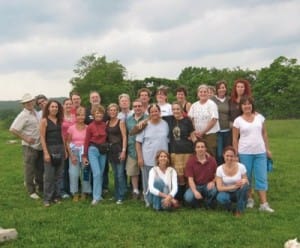By Gina Marchando, DMFT, LMFT, CHT, CIT, Clinical Director at The Ranch Love and attachment are basic human needs. Like animals have packs, we instinctively gravitate toward other people. Loving others and wanting to be loved is natural and normal. But sometimes our concept of love becomes an unhealthy obsession that can lead us to act compulsively and destructively. This is when the natural need for healthy human connection becomes love addiction.
How Love Addiction Develops
As children, we learn to speak and understand feelings from the adults around us. This is how we construct our emotional intelligence and literacy. If we’re surrounded by unhealthy models or people with their own unresolved hurt and pain from the past, chances are our own needs won’t be met, nor will our emotional literacy develop to its full potential. Usually in these cases, our own sense of being needed or wanted is incomplete. As small children, we may not have the linguistic or cognitive capacity to fully understand what is going on around us; however, our ability to sense things and make assessments accordingly based off of observation is astute. Children can learn quickly in life that in order to be loved, accepted or appreciated they must take care of another person, either physically or emotionally. It’s been said that abandonment is at the core of all addictions. Abandonment doesn’t necessarily have to involve someone physically leaving you. Abandonment and subsequent attachment injuries can result from physical, emotional and sexual violations as well as through a parent or caregiver’s emotional unavailability. Abandonment is traumatic and psychically painful and can leave an empty, gaping “hole” in the pit of our stomach. Many of us try to fill that hole with unhealthy behaviors that can quickly spiral into addictions of various kinds, from drugs and alcohol to sex, shopping, food and relationships.
What Love Addiction Looks Like
A common misconception is that codependency and love addiction are one and the same. While there is some overlap between the two, not all codependents are love addicts. Renowned clinician, author and authority on relationships and addictions Pia Mellody has noted that core codependency symptoms manifest as a result of childhood trauma, which leaves individuals stunted emotionally. These symptoms can follow a trajectory that includes any of the following:
- Difficulty loving or protecting oneself
- Difficulty identifying who one is and knowing how to share that appropriately with others
- Difficulty with self-care
- Difficulty being appropriate for one’s age and circumstances
- A drive for negative control (either controlling others or allowing oneself to be controlled)
- Carrying resentments
- Impaired spirituality
- Addictions and difficulty with intimacy
A love addict will turn to a certain type of relationship, typically romantic, believing that the other person has the ability to soothe their internal pain if only they can give that person enough care, love and attention. The love addict usually doesn’t partner with another love addict. Love addicts have a tendency to select a “love avoidant.” This is someone who has a history of enmeshment trauma and will distance themselves from the addict’s desire due to fear of being suffocated and controlled.
How Love Addiction Is Similar to Substance Abuse
There are certain chemical “highs” created by feelings of love, intimacy and attraction. The pleasure that comes with drug and alcohol addictions results from an excited brain. Research shows that our reward system – specifically dopamine pathways and oxytocin associated with energy, focus, motivation, and intense feelings of ecstasy and despair – are equally activated for the love addict. The “thrill of the chase” is the high for the love addict; they thrive off of the emotional intensity that comes from the pursuit. Often individuals will describe feeling rejuvenated, refreshed and alive when active in their addiction. This is also a downfall, as they will tend to stay in unhealthy and even abusive situations in an attempt to regain the high they initially felt. They can become steadfast and determined to figure out how to change in order to win back the object of their affection’s attention and adoration.
Love Addiction Recovery
In recovery, the love addict needs to explore unresolved wounds such as the toxic shame that they have buried as a result of abandonment. They need to accept and understand that their underlying abandonment and rejection injuries are at the core of this vicious cycle of selecting individuals who are not fully available and provide a false sense of security. They also need to learn practical life skills such as setting boundaries and engaging in healthy communication and relationships. Learning how to say “no” and redefining one’s self-worth will go an incredible distance as they learn that they’re worthy of reciprocal love and respect. Recovery from love addiction is possible. With guidance and support you can begin to heal emotional wounds from the past that keep you stuck in unhealthy relationship patterns. You can learn to love yourself and discover what healthy relationships look and feel like. If you’re caught in the love addiction cycle, give yourself the gift of recovery. Get the help you need to get better.


